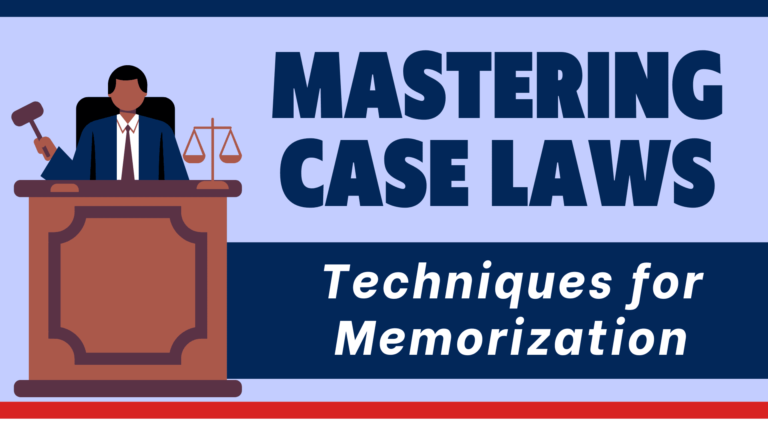Balancing Legal Theory and Current Affairs in Judiciary Exams: A Guide for Success

When it comes to preparing for judiciary exams, there are a few key factors to keep in mind. One of the most important considerations is how to balance legal theory with current affairs.
While a solid understanding of legal theory is essential for success on these exams, it’s also crucial to stay up-to-date on current events and legal developments. In this post, we’ll explore some strategies for striking the right balance between these two areas.

One of the biggest challenges that aspiring lawyers face when preparing for judiciary exams is staying on top of current events. With so much happening in the legal world on a daily basis, it can be difficult to know where to focus your attention.
However, it’s important to remember that current affairs can have a significant impact on the questions you’ll encounter in these exams. By staying informed about recent court decisions, legislative developments, and other legal updates, you’ll be better equipped to tackle even the most challenging questions.
Of course, it’s also important to have a solid understanding of legal theory. After all, these exams are designed to test your knowledge of the law and your ability to apply it to real-world scenarios. To succeed, you’ll need to have a firm grasp of legal concepts, terminology, and principles.
However, it’s important to remember that legal theory is just one piece of the puzzle. By finding ways to integrate current affairs into your preparation process, you’ll be able to approach these exams with a more well-rounded perspective.
Page Contents
Why Strategic Exam Preparation is Important?

Preparing for judiciary exams is a crucial step towards a successful legal career. However, it is not just about studying hard, but also about preparing strategically. Here are some reasons why strategic exam preparation is important:
Preparation
Strategic exam preparation involves creating a study plan that covers all the relevant topics and ensures that you are well-prepared for the exam. This includes identifying your strengths and weaknesses, and focusing on areas that require more attention.
Study Schedule
Creating a study schedule is an essential part of strategic exam preparation. This involves allocating time for each subject and topic, and ensuring that you have enough time to revise and practice. A well-planned study schedule can help you manage your time effectively, and avoid last-minute cramming.
Time Management
Time management is critical when preparing for judiciary exams. You need to balance your study time with other commitments, such as work or family. A well-planned study schedule can help you manage your time effectively, and avoid burnout.
Legal Developments
Judiciary exams are not just about legal theory, but also about current legal developments. Keeping up-to-date with legal developments can help you answer questions more effectively and score higher marks.
Legal Current Affairs
Legal current affairs refer to recent legal events that have an impact on the legal system. Keeping up-to-date with legal current affairs can help you understand the context of legal developments, and answer Questions more effectively.
In nutshell, strategic exam preparation is essential for success in judiciary exams. It involves creating a study plan, managing your time effectively, and keeping up-to-date with legal developments and current affairs. By preparing strategically, you can increase your chances of success and achieve your career goals.
Critical Legal Knowledge
To excel in judiciary exams, you need to have a strong grasp of critical legal knowledge. This section will cover the essential topics that you should focus on while preparing for the exam.
Constitutional Law Essentials
Constitutional law is an essential part of the judiciary exam. You should have a thorough understanding of the Indian Constitution, its principles, and its provisions. You should also be familiar with the various amendments that have been made to the Constitution over the years.
To help you prepare, we recommend that you create a study plan that covers the topics and related Case laws.
Criminal and Civil Laws
Criminal and civil laws are two critical areas that you should focus on while preparing for the judiciary exam. You should have a good understanding of the Indian Penal Code (IPC) and the Code of Criminal Procedure (CrPC). You should also be familiar with the various civil laws, including the Indian Contract Act, the Specific Relief Act, and the Limitation Act.
To help you prepare, we recommend that you create a plan along with the list of important case laws which will help you to fetch good score in prelims and in Mains as well.
Landmark Judgments Analysis
Landmark judgments are an essential part of the judiciary exam. You should be familiar with the significant judgments that have been made by the Supreme Court and the High Courts. You should also be able to analyze and interpret these judgments.
By focusing on these critical areas, you can develop a strong foundation of legal knowledge that will help you excel in the judiciary exams.
State-Specific Judiciary Exams
When it comes to state-specific judiciary exams, it is important to understand the legal provisions and the current affairs of the specific state. Each state has its own set of laws and regulations, and it is essential for the candidates to be well-versed with them.
Adapting to Regional Legal Provisions
One of the significant challenges that candidates face while preparing for state-specific judiciary exams is adapting to the regional legal provisions.
To adapt to these regional legal provisions, candidates need to go through the bare acts of the specific state thoroughly. The additional subjects help to fetch good score in the examination.
Apart from the legal provisions, the candidates also need to be aware of the current affairs of the state as well.
To keep up with the current affairs of the state, candidates need to read the local newspapers and stay updated with the latest developments. It is also advisable to take help from the online resources and social media platforms to get a broader perspective on the state’s current affairs.
In state-specific judiciary exams require candidates to be well-versed with the regional legal provisions and the current affairs of the particular state. By adapting to the state’s legal provisions and staying updated with the current affairs, candidates can increase their chances of clearing the state-specific judiciary exams.
Also Check: How to Master Case Laws: Techniques and Application
Enhancing Legal Aptitude
To excel in judiciary exams, it is crucial to have a strong legal aptitude. This section will discuss two key strategies to enhance your legal aptitude: analyzing legal concepts and setting realistic goals.
Analyzing Legal Concepts
As a legal professional, it is essential to have a thorough understanding of legal concepts. To develop this understanding, you should analyze legal concepts from multiple angles.
For instance, you can break down complex legal concepts into smaller, more manageable parts. You can also use visual aids such as diagrams or flowcharts to help you understand the relationships between different legal concepts.
Additionally, you should develop a tolerance for ambiguity.
Legal concepts are not always black and white, and you must be comfortable with interpreting and applying the law in various situations. This tolerance for ambiguity will help you become a more confident legal professional as you practice more and more.
Realistic Goal Setting
Preparing for a prestigious Judiciary exam can be overwhelming, and it is easy to become discouraged. To avoid this, you should set realistic goals for yourself. Start by breaking down your preparation into smaller, more manageable tasks. This will give you a sense of accomplishment as you complete each task and help you stay motivated.
It is also essential to set realistic goals for your exam performance. While it is good to aim high, setting unrealistic goals can be demotivating. Instead, set goals that are challenging but achievable. This will help you build confidence and improve your performance in the legal field.
In conclusion, enhancing your legal aptitude requires a combination of analyzing legal concepts and setting realistic goals. By following these strategies, you can improve your legal understanding, build confidence, and excel in your judiciary exams.
As a law student or a candidate preparing for judiciary exams, it is crucial to stay updated with the latest legal developments and current affairs. The legal landscape is constantly evolving, and it is essential to keep up with the changes to succeed in the field.
Staying Abreast with Legal Updates
To stay up-to-date with legal updates and current affairs, you can follow legal news, subscribe to legal magazines, and attend seminars and conferences. You can also join online discussion forums and groups related to the legal field to stay connected with other professionals and get insights into the latest developments.
It is essential to keep a tab on recent legal changes, including amendments to existing laws, new bills, and landmark judgments. This will help you understand the implications of these changes and how they may impact your work as a legal professional.
Case Studies on Legal Amendments
To gain a deeper understanding of legal changes and their impact, you can study case studies related to recent legal amendments. For instance, the Supreme Court’s recent judgment on the Sabarimala temple entry case has significant implications for the rights of women in India. Similarly, the decriminalization of homosexuality in India has far-reaching legal and social implications.
Staying updated with legal developments and current affairs is essential for anyone preparing for judiciary exams or working in the legal field. It is crucial to follow reliable sources of information, study recent legal changes and their impact, and understand landmark judgments and case studies to succeed in the field.
Focus Areas
To achieve success in judiciary exams, you need to balance legal theory with current affairs. This requires a well-planned approach with a focus on the following areas:
Preliminary Exam Preparation
The preliminary exam is the first step towards becoming a judge. To prepare for it, you need to have a good understanding of the basics of law. This includes topics such as Constitution, Indian Penal Code, Civil Procedure Code, Criminal Procedure Code, and Evidence Act.
You can also refer to previous year question papers to get an idea of the exam pattern and the types of questions asked. Make sure to revise regularly and practice mock tests to improve your speed and accuracy.
Mains Exam In-Depth Study
The mains exam is more detailed and requires an in-depth study of various legal topics. You need to have a thorough understanding of the subjects and be able to apply them in practical situations.
You also need to be aware of current legal issues and judgments. Make sure to read relevant case laws and articles to stay updated.
Interview Confidence Building
The interview is the final stage of the judiciary exams preparation and requires confidence and communication skills.
To build confidence, you can practice mock interviews with friends or family members. You can also read newspapers and watch news channels to improve your knowledge of current affairs. Make sure to dress appropriately and maintain a positive attitude during the interview.
By focusing on these areas, you can plan your preparation and improve your chances of success in the judiciary exam. Remember to stay confident, knowledgeable, and clear in your approach. All the Best!
Also check: List of Most Important 150 Landmark Judgments







